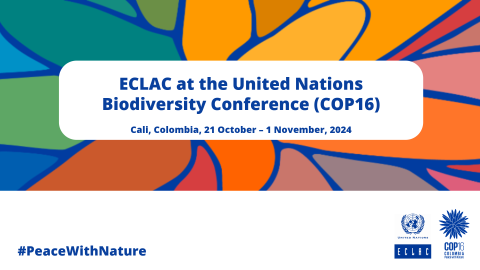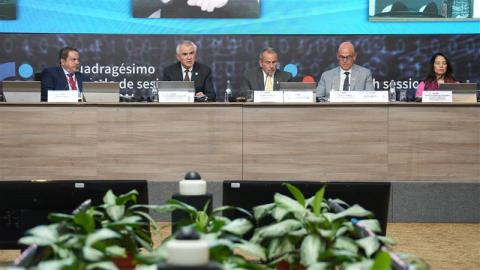Briefing note
Heading to COP 30: NDC 3.0, investments and financing
Background
Nationally Determined Contributions (NDCs) include the national climate commitments established by countries in the framework of the Paris Agreement (PA). They define the mitigation and adaptation actions they will take to achieve the goal of limiting an average global temperature increase to 2°C, with efforts to not exceed 1.5°C, be more resilient to climate change, and ensure sufficient financing to achieve these goals.
The NDCs are short- and medium-term plans that must be updated every five years with increasingly ambitious targets, depending on each country's capabilities.
The Latin American and Caribbean (LAC) region, with a relatively small contribution to greenhouse gas (GHG) emissions but a high vulnerability to climate change, needs to attach great importance to the goal of not exceeding 1.5 ºC and to adaptation to new climate conditions.
The most recent IPCC report indicates that widespread and rapid changes have occurred in all ecosystems. It tells us that anthropogenic climate change is already impacting through acute and chronic extreme weather events around the world. These impacts generate losses and damages related to nature and people. Vulnerable communities, which historically have contributed the least to current climate change, are disproportionately affected, including those in Latin America and the Caribbean.
Climate change has caused substantial damage, and increasingly irreversible losses, to terrestrial, freshwater, cryospheric, coastal and open ocean ecosystems. Hundreds of local species losses have been driven by increases in the magnitude of heat extremes with mass mortality events reported on land and in the ocean. Impacts on some ecosystems are approaching irreversibility, such as the impacts of hydrological changes resulting from glacial retreat, or changes in some mountain ecosystems driven by thawing permafrost.
In this sense and recalling the importance of the IPCC's own Special Report on 1.5oC, being this region so vulnerable to climate change, we must face the challenge of presenting more ambitious NDCs, in addition to preparing for the inevitable, through plans and measures for adaptation and resilience, contribute to mitigation, with a sense of urgency.
Finance supports the investments that are necessary for the economic transformation required to deal with climate change and biodiversity loss, the latter linked to the need to strengthen the resilience of our ecosystems as a critical instrument for adaptation.
The alignment of financial markets with the objectives of the SDGs and the Paris Agreement are for the benefit of the market agents themselves, financial institutions and their environment, because we constantly have more evidence that the greening of finance is the best strategy for mitigating financial risks and taking advantage of opportunities in times where we are reaching and surpassing planetary boundaries, particularly climate change and biodiversity loss.
The expansion of ambition must be carried out with realism, understanding that the cost of inaction is higher. In this sense, it is timely to set up a space for conversation, exchange and reflection between ministries of finance, planning and environment and actors of the financial and private sector around the challenge of designing, implementing and financing the most ambitious NDC 3.0 in the current economic and fiscal context of Latin America and the Caribbean.
It is necessary to work together to develop NDCs that take advantage of the opportunities to generate socioeconomic “co-benefits” while mitigating greenhouse gases and adapting to the inevitable effects of climate change.
Objective
Generate a space for dialogue and cooperation towards Belem among representatives of the ministries of environment, planning and finance in order to outline roadmaps towards COP 30 for the financing of the new goals included in the NDCs, with the support of international cooperation, based on their different offers.
Activities
- Presentation of report on NDC and economic plans / investment needs - lessons learned.
- Review of physical risk materialization and transition facts: call for action from the economy.
- Experiences in reviewing new NDCs: countries.
- Experiences in financing new NDCs.
- Experiences of inter-ministerial collaborations: countries.
- Review of available support: cooperation agencies.
- Best practices: countries.
- Scenario modeling and LTS: NDCs as stepping stones.
- Road to Belem: Activation of the NDC community for the next 3/5 months.
28 Jan 2025
-
Participants register
08:30 to 09:00 -
Welcome and meeting purpose
09:00 to 09:30 -
1. Presentation on the evidence regarding misalignment between economic strategies and climate action (input document for the g20 brazilian presidency).
09:30 to 10:30Presentation of the document: "National economic development plans: Their contributions to climate goals under the Paris Agreement", prepared by ECLAC for the Brazilian Presidency of the G20 Climate Task Force. This document highlights the misalignment between economic strategies and NDCs, which results in missed opportunities for sustainable development while exacerbating economic risks associated with climate change.
Commentary by Brazil:
Brazil will provide comments on these findings and present the proposal for “country platforms”.
-
2. Challenges building NDC 3.0 How countries are undertaking the NDC process: What are we doing? & what is missed?
11:00 to 13:00Some country representatives will share updates on their NDC development processes, including actions in mitigation and adaptation sectors and the challenges of increasing ambition.
Panamá, Nature Pledge - Juan Carlos Monterrey
-
3. Financing NDCs: country experience
14:30 to 15:30This session aims to facilitate an exchange among participants to share strategies that support the financial viability of the next generation of NDCs.
A dialogue space will be provided to analyze the experiences of finance and environment ministries regarding mechanisms and strategies for financing during the NDC 3.0 update. The discussion will focus on identifying key needs and gaps—technical, governance-related, and others—to ensure the new NDCs effectively integrate diverse financial sources, including the private sector.
Additionally, this session will deepen the discussion on previous experiences involving the financial sector in NDC financing. The goal is to map existing support, share lessons learned, and collaboratively define clear pathways to improve the bankability of NDC 3.0.
-
4. Industrial policies and climate targets How to support implementation?
16:00 to 17:30NDCs as a medium-term strategic framework and investment plans as drivers of the necessary economic transformation.
Climate action requires transforming our economies, and NDCs can serve as a guide for this transformation and as a tool for aligning public policies and incentives to mobilize capital and achieve the required investment levels.
-
Wrap up
17:30 to 18:00
29 Jan 2025
-
5. Interministerial collaboration models
09:00 to 10:30In this session, government representatives will present coordination mechanisms within governments and with various stakeholders.
-
6. Mobilizing of financial and private sector to accelerate NDC implementation
11:00 to 12:30This session is designed to provide a platform for exchanging best practices, innovative financial instruments, and effective schemes for mobilizing climate finance in Latin America and the Caribbean.
Through a participatory dynamic, participants will analyze challenges and opportunities related to climate finance mobilization, including broad private sector involvement. The session aims to map existing support, share lessons learned, and collaboratively define clear pathways to mobilize resources that support NDC implementation.
-
7. The finance ecosystem to implement NDC 3.0
13:30 to 15:00For the financial system to transition towards sustainability and contribute to climate action, it is essential to develop tools and strengthen the capacities of the institutions involved.
Various international organizations are already supporting countries in these efforts. Several of them will be present at this event to enhance collaboration and coordination. This session will focus on agreeing on best practices to increase synergy among these organizations and improve coordination with government entities involved in this agenda.
-
8. Roadmap and closing
15:30 to 17:00A summary of the work carried out during the two days will be presented, and follow-up mechanisms to support the NDCs of countries in the Latin American and Caribbean region will be agreed upon.



